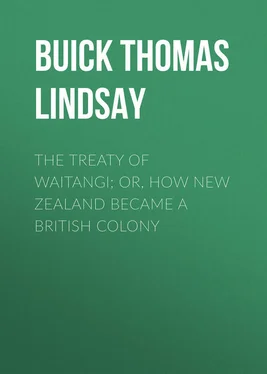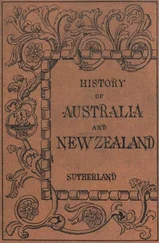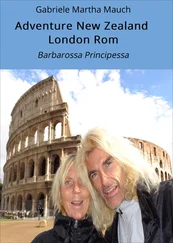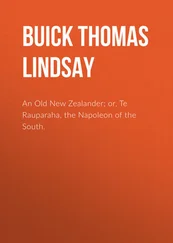Thomas Buick - The Treaty of Waitangi; or, how New Zealand became a British Colony
Здесь есть возможность читать онлайн «Thomas Buick - The Treaty of Waitangi; or, how New Zealand became a British Colony» — ознакомительный отрывок электронной книги совершенно бесплатно, а после прочтения отрывка купить полную версию. В некоторых случаях можно слушать аудио, скачать через торрент в формате fb2 и присутствует краткое содержание. Жанр: foreign_antique, foreign_prose, на английском языке. Описание произведения, (предисловие) а так же отзывы посетителей доступны на портале библиотеки ЛибКат.
- Название:The Treaty of Waitangi; or, how New Zealand became a British Colony
- Автор:
- Жанр:
- Год:неизвестен
- ISBN:нет данных
- Рейтинг книги:5 / 5. Голосов: 1
-
Избранное:Добавить в избранное
- Отзывы:
-
Ваша оценка:
- 100
- 1
- 2
- 3
- 4
- 5
The Treaty of Waitangi; or, how New Zealand became a British Colony: краткое содержание, описание и аннотация
Предлагаем к чтению аннотацию, описание, краткое содержание или предисловие (зависит от того, что написал сам автор книги «The Treaty of Waitangi; or, how New Zealand became a British Colony»). Если вы не нашли необходимую информацию о книге — напишите в комментариях, мы постараемся отыскать её.
The Treaty of Waitangi; or, how New Zealand became a British Colony — читать онлайн ознакомительный отрывок
Ниже представлен текст книги, разбитый по страницам. Система сохранения места последней прочитанной страницы, позволяет с удобством читать онлайн бесплатно книгу «The Treaty of Waitangi; or, how New Zealand became a British Colony», без необходимости каждый раз заново искать на чём Вы остановились. Поставьте закладку, и сможете в любой момент перейти на страницу, на которой закончили чтение.
Интервал:
Закладка:
It did not, however, enter into the proposal of Mr. Busby that the British Government should be both in theory and in fact the administrative authority. He still contemplated the retention of the federated chiefs as the nominal source of power, with himself as its presiding genius. "In theory and ostensibly the government would be that of the confederated chiefs, but in reality it must necessarily be that of the protecting power. The chiefs would meet annually, or oftener, and nominally enact the laws proposed to them, but in truth the present race of chiefs could not be entrusted with any discretion whatever in the adoption or rejection of any measure that might be submitted to them."
He proposed to constitute the chiefs guardians of the peace and public morals, and to pay them for their services. Schools were to be established, and the Missionaries and catechists were, as far as their duties would permit, to be appointed Justices of the Peace, whose decisions were, if needs must, to be supported by a military force. Even a periodical newspaper was provided for as a means of "instructing the natives in those relative duties of the people and their rulers, which are familiar to all ranks of the population under established Government, but of which the New Zealanders have scarcely yet formed an idea." Revenue was to be raised by an impost on shipping and a duty upon spirits and tobacco. Indeed, so modest was his contemplated civil establishment that he estimated an expenditure of not more than £1000 per annum would be sufficient to maintain it in adequate splendour. All existing land claims were to be settled by an independent commission, and after that all titles were to be void unless procured through the Government, whose special duty it would be to see that ample reserves were retained for the natives.
Mr. Busby, in submitting these proposals, ventured to suggest that they might be presumed to give an effective degree of protection to the British subjects resident in New Zealand, without infringing on the rights of the New Zealanders as an independent people and at the same time "satisfy the reasonable scruples of a foreign Government." This latter condition was one that in maturing their plans the British Cabinet could not leave out of their consideration; for already both France and America were factors to be counted upon in the South Pacific, and might with almost equal justice claim a share in the sovereignty of the country.
The Government were still wrestling with the perplexities of the position when the New Zealand Association rose into being, and served to still further complicate the issues. There was an opinion in political circles, afterwards crystallised into a definite recommendation by the House of Lords, that the colonisation of New Zealand was the duty of the State, if it was Britain's duty at all, but private enterprise had never been wholly disassociated from the scheme. 29 29 In 1821 Mr. Henry Goulburn, by direction of Earl Bathurst, informed R. M. Sugden that his Lordship "did not feel he had any power of approving any particular encouragement to the establishment of a colony in New Zealand." In 1822 Earl Bathurst informed Thomas England and Messrs. Taylor and Upton that no encouragement was given by the Government to settlers to proceed to New Zealand. In the same year Mr. John Thomson, A.M., Edinburgh, offered to found a colony of 50 sober men, 100 Sepoys, and 100 convicts, as "the inhabitants of New Zealand are just in that state of civilisation to be made useful." In November 1823 Lieutenant-Colonel Nicolls, an ex-Indian officer, made a proposal to Earl Bathurst to establish a colony of military pensioners. In the following month Baron de Thierry's scheme was brought under the notice of the Government. The year 1825 saw the first New Zealand Company established. Colonel R. Torrens, who afterwards did such good work in South Australia, applied in 1826 for the command of a military force in New Zealand, and so enable him to "make preliminary arrangements which would facilitate the future colonisation of these islands upon sound economical principles."
As far back as 1825 a New Zealand Company, "acting with the sanction and encouragement of the Government," had been formed under Lord Durham, and had acquired an estate on the banks of the Hokianga River. This settlement, under Captain Heard, had been of the most fugitive character; but the land still remained more or less an asset, and subsequently was acquired by the New Zealand Association, founded in 1837 by the Hon. Francis Baring, M.P. for Sheffield, in conjunction with other gentlemen prominent in English public life of that day. This Association grew out of an enquiry made at the instance of the House of Commons by a committee called the Committee on Colonial Lands, but the real subject of the enquiry was colonisation. One of the principal witnesses was Mr. Edward Gibbon Wakefield, who gave some account of the then existing state of New Zealand, and spoke of it as a country extremely eligible for the purpose of British colonisation, provided some regular system should be adopted in place of the lawless practices that were then rampant. In consequence of that statement, a member of the committee spoke to him upon the subject of colonising New Zealand. Subsequently other gentlemen were admitted to their discussions, and as a result of their joint deliberations they determined to form an Association for the purpose of obtaining from Parliament (for Parliamentary aid was considered essential) some regulation both for the colonisation and the government of the Islands, to take the place of the irregular practices that were then on foot.
There is little doubt that in its inception the Association had a large measure of philanthropy underlying its principles, for it was the outcome of the unsatisfactory social conditions existing in England at that period. The scheme attracted to its aid men of wealth and culture, and under the organising genius of Edward Gibbon Wakefield it acquired an influence, both social and political, which no government could safely regard with indifference. 30 30 It was said that at one period of its existence the New Zealand Association could command 42 votes in the House of Commons.
To secure New Zealand as a British possession; to find a profitable investment for British capital; and to provide employment and opportunity for England's idle labour were the nominal objects for which the Association had been formed. To give these purposes practical effect the Association had, under the guiding hand of Wakefield, formulated definite theories upon the subject of colonisation; and to the end that their ideals might be achieved they sought the assistance of the Government and the sanction of Parliament.
On a day in June 1837 they secured an interview with the Prime Minister, Lord Melbourne, whom they found attended by Lord Howick, a member of the Government, though not of the Colonial Office, and who was present, so they were told, in the character of an adviser on the subject, he having paid considerable attention to colonial problems. The aims and purposes of the Association were laid before the Ministers by Mr. Baring, chairman of the society, and the result of the deputation was an assurance from the Premier that for himself he saw no objection to the scheme of the Association, and that he perceived in some of their purposes a laudable object, but that not being familiarly conversant with such subjects he did not care to do more than to express his general approbation, and to refer the deputation for the discussion of all matters of detail to Lord Howick, who was well informed on all such questions, and who possessed, in the office which he held, as much leisure as would enable him to attend to the subject. The committee was highly satisfied with their interview, and communicated in various ways with Lord Howick upon the details of their plan, amongst other things submitting to him a draft of the Bill which they proposed to introduce into the House of Commons. Lord Howick examined the Bill, and both in conversation and in writing suggested various modifications, which though not universally approved by the promoters, were adopted in their entirety rather than risk the loss of that influence which they considered essential to the success of their plan – the assistance of the Executive Government. The death of the King, William IV., at this juncture, put a sudden termination to their political proceedings; but the outlook for their negotiation appeared so satisfactory that, pending the assembly of the new Parliament, they published an invitation to all persons so disposed to join the Association for the purpose of emigrating to New Zealand. The publication of this resolution drew to their ranks a large body of wealthy and influential people; and when Parliament met again in December of the same year a very considerable number of persons had expressed their intention of settling in the new colony. Accordingly the committee, on December 13, again waited on Lord Melbourne with a view to obtaining his final approval upon the measure which they proposed to submit to the Commons. As at the previous interview, the object of the Association in seeking this second conference was stated by Mr. Baring, when Lord Melbourne, who appeared to have forgotten what had passed on the former occasion, referred the deputation to Lord Glenelg, who was present as Colonial Minister.
Читать дальшеИнтервал:
Закладка:
Похожие книги на «The Treaty of Waitangi; or, how New Zealand became a British Colony»
Представляем Вашему вниманию похожие книги на «The Treaty of Waitangi; or, how New Zealand became a British Colony» списком для выбора. Мы отобрали схожую по названию и смыслу литературу в надежде предоставить читателям больше вариантов отыскать новые, интересные, ещё непрочитанные произведения.
Обсуждение, отзывы о книге «The Treaty of Waitangi; or, how New Zealand became a British Colony» и просто собственные мнения читателей. Оставьте ваши комментарии, напишите, что Вы думаете о произведении, его смысле или главных героях. Укажите что конкретно понравилось, а что нет, и почему Вы так считаете.












